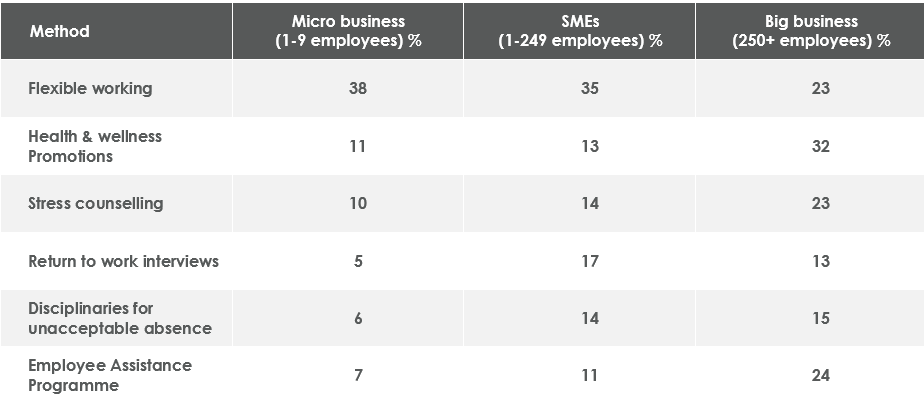New research has highlighted that SMEs are using flexible working more effectively than larger businesses in controlling absence than their larger counterparts.
The research* from Group Risk Development (GRiD), the industry body for the group risk protection sector, has shown that absence is an issue across the board for businesses of all shapes and sizes, and across all sectors and locations. However, the research also reveals that smaller businesses, possibly with more limited HR and benefits resources in comparison to big businesses, are taking more practical measures to reduce absence, with flexible working policies at the top of the list of measures.
Katharine Moxham, spokesperson for GRiD said: “The larger the workforce, the easier it is to offer flexible working but the harder it is to monitor it. If smaller businesses are making this work as an absence-management solution though, there is no reason why larger business couldn’t do the same.”
The GRiD research shows that:
- 35% of SMEs with up to 249 employees are actively using flexible working strategies to combat absence compared to just 23% of organisations with over 250 employees.
- Drilling down further into the detail, 38% of micro businesses with between 1 and 9 employees use flexible working as a means to reduce absence.
Moxham continued: “It’s encouraging to see small businesses employing creative ways to target absence. There also seems to be a greater propensity among SMEs to arrange return-to-work interviews for similar purposes.”
How does flexible working reduce absence management in practise?
Flexible working is so much more than allowing an employee to work from home when they are feeling under the weather, and following changes in the law in 2014, it is now an option for everyone with at least 26 weeks continuous employment to request it – not just those with children or carer responsibilities.** It also includes part-time working, term-time working, job sharing, compressed hours and flexitime. A greater degree of flexibility can increase productivity and reduce burn out, particularly in stressful occupations.
GRiD’s research also highlighted other top-ranked ways that organisations are seeking to control absence levels and improve attendance:

Katharine Moxham goes on to say: “It’s evident in these figures that smaller and larger organisations take a very different approach to managing absence, and whilst that is perhaps to be expected, an area where all could benefit is by better utilising the support that exists for employers, line managers and employees at no extra cost within group risk products.”
Group risk as a means to improve absence
GRiD points out that group risk products themselves can cost relatively little compared with the other component parts of an employee benefits package, so are accessible to most businesses. As well as providing financial benefits and additional support to employees, they also have inbuilt services to help keep people at work and group income protection in particular can facilitate a quick return to work – even in cases where no claim is made – which also benefits the employer.
GRiD stresses that the cause of an absence can range from minor issues through to more complex, multi-faceted problems – particularly in the case of mental health issues – and it can be difficult to know when and how to intervene. A robust absence management programme needs to cover all bases to be successful. Although offering flexible working can turn what might have been an absence in to a productive day, it doesn’t pick up the pieces when things go really wrong for a member of staff.
Moxham concluded: “If you have staff with qualifications in physiotherapy to help employees with musculoskeletal conditions; medical experts to offer a second opinion, psychologists and psychiatrists to support those with mental health conditions; relationship counsellors; and other expert therapists, you may not need the support provided within a group risk policy. However, for organisations that don’t, having support in place via group risk benefits that offers early intervention backed up with a variety of expertise, can make a huge impact to absence levels.”
Notes:
*The research was undertaken by Opinium on behalf of Group Risk Development (GRiD), amongst 500 HR decision makers in 500 UK businesses, including 100 in companies with more than 250 employees, during November 2017.
The GRiD Research was sponsored by Aviva, Canada Life, The Chartered Insurance Institute, Ellipse, Generali Global, Gen Re, JLT, Kerr Henderson, Legal & General, Medical Expenses Consulting (UK) Ltd, Munich Re, Punter Southall Health & Protection, Quantum Advisory, SCOR, Self Assured Ltd, Swiss Re, Unum, Wingate Benefit Solutions, Xafinity Consulting and Zurich Corporate Risk.
**https://www.gov.uk/flexible-working



